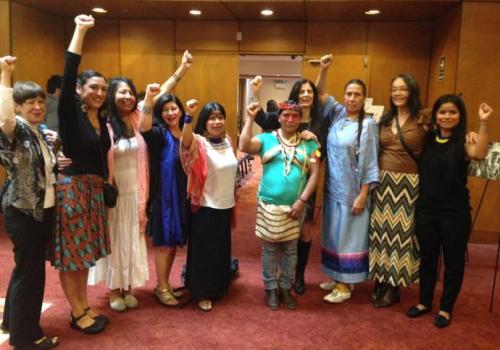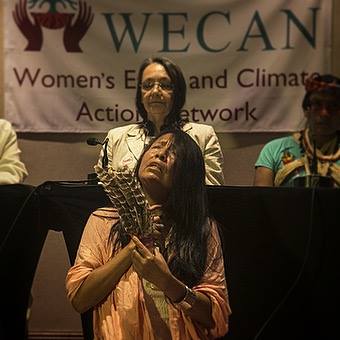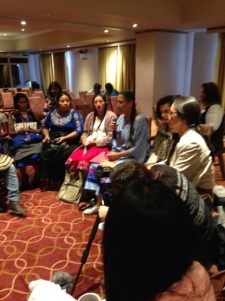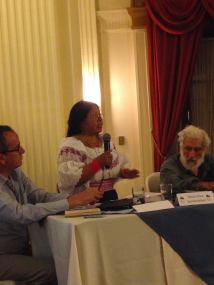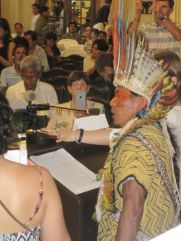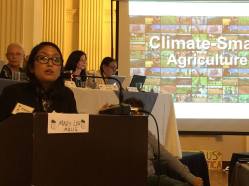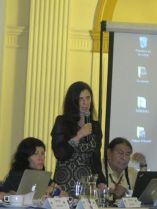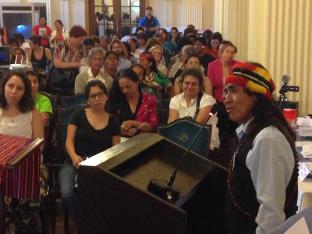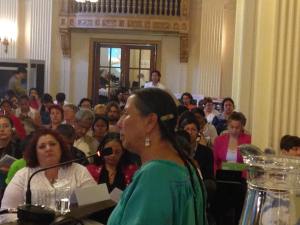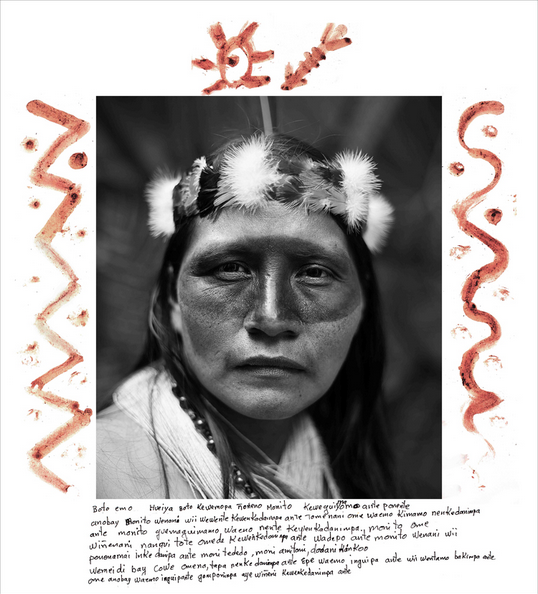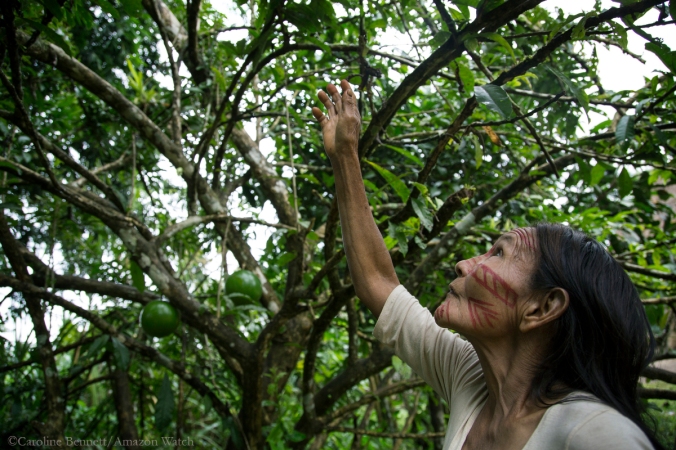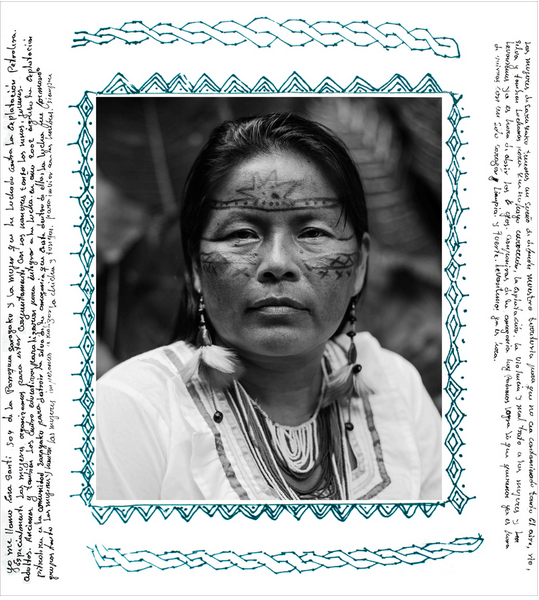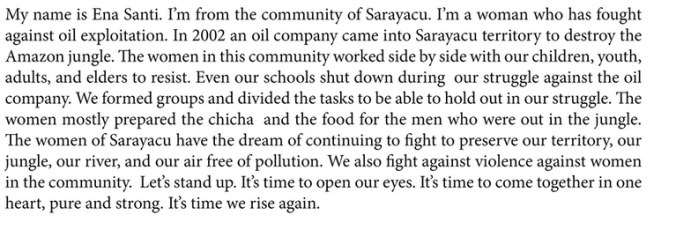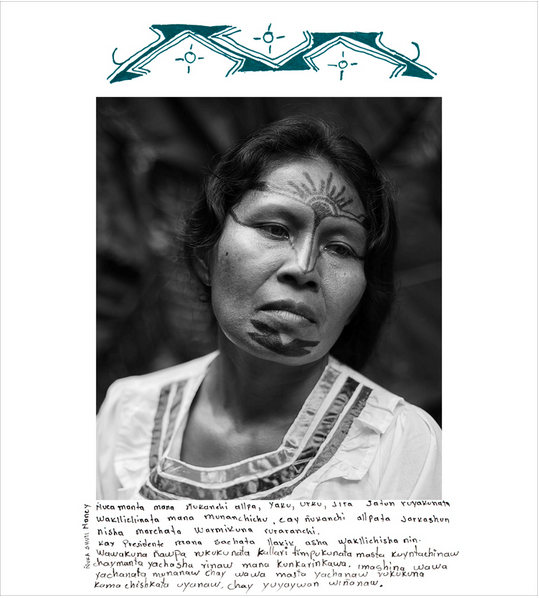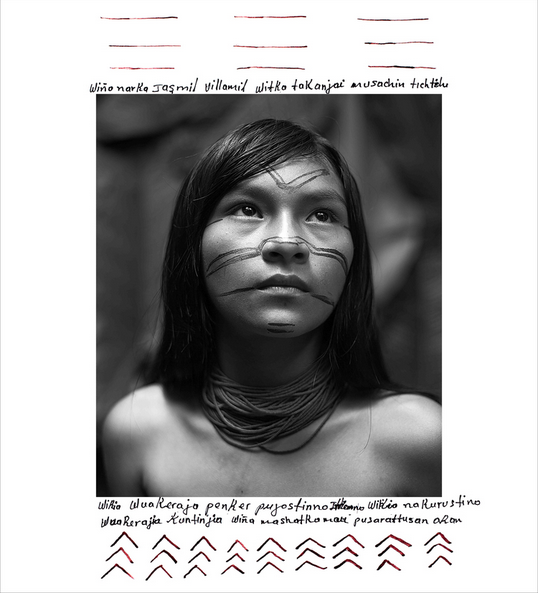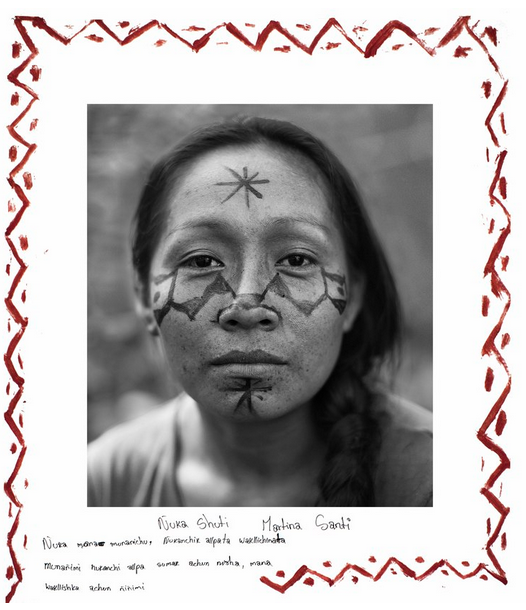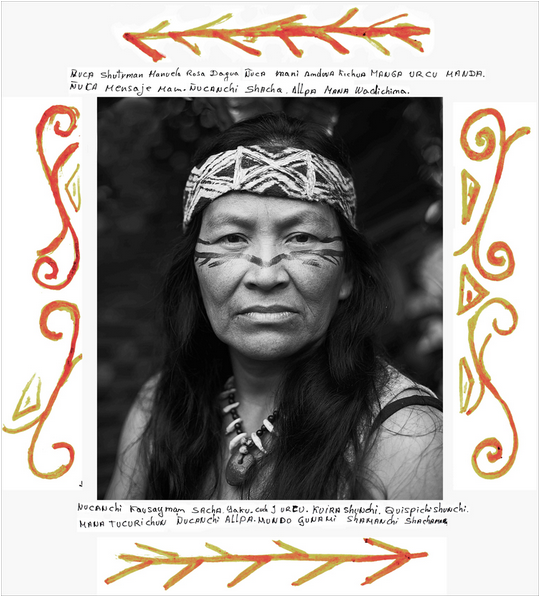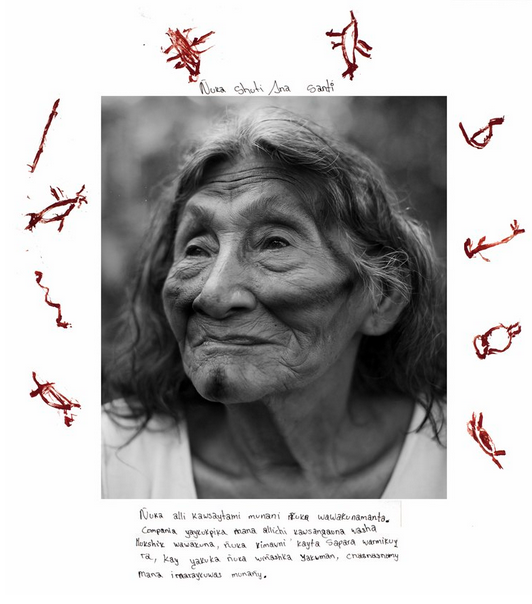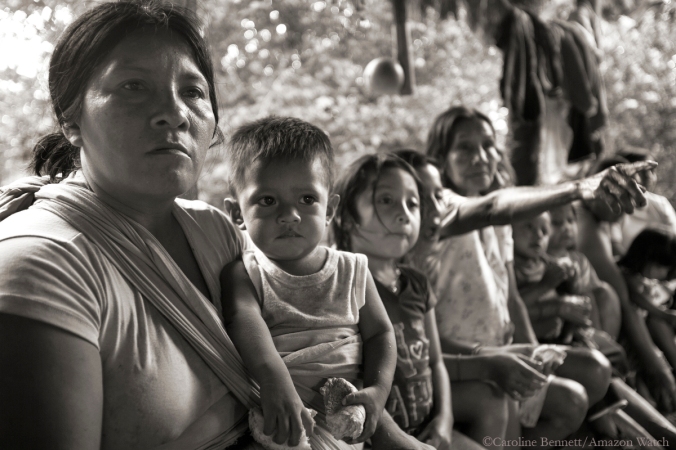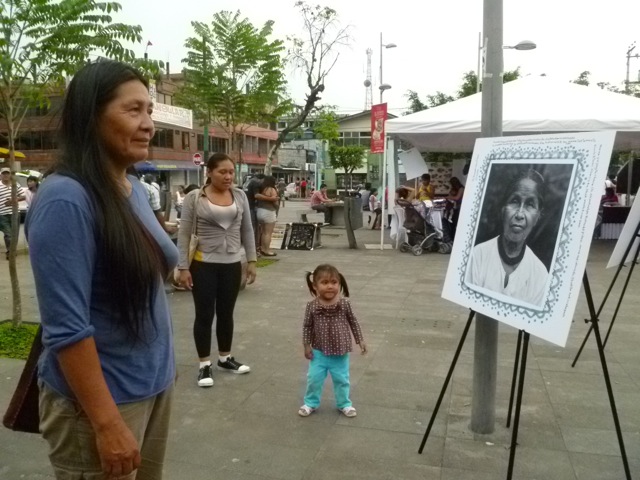On December 8, 2014, a group of extraordinary women leaders gathered in Lima, Peru to speak out against issues of social and ecologic injustice, and to share stories and plans of action for building a livable, equitable world.
‘Women Leading Solutions on the Frontlines of Climate Change-Lima’ was hosted by the Women’s Earth and Climate Action Network (WECAN International) as part of the mobilization surrounding the UNFCCC COP20 climate negotiations, held in Lima that same week. Crucially, the event created a platform to bring to the forefront some of the voices that have been historically excluded, particularly those of Indigenous women.
The event opened with a powerful welcome ceremony, led by Eda Zavala, an Indigenous leader from Tarapoto, Peru.
WECAN International Co-Founder and Executive Director, Osprey Orielle Lake, introduced the event,
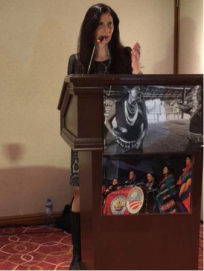
Osprey Orielle Lake, WECAN International Executive Director.
“We are here today to explore what we, as women from different parts of the world, can do to accelerate our collective efforts to stop extractivism and protect our lands and children’s future. How can we as women connect more deeply in our defense and protection of the web of life and the Earth in the face of climate change and dangerous economic and legal frameworks? How can women of the Global South and North work in deeper collaboration, and how can we recognize and act upon the historic responsibilities of industrialized countries and so-called wealthier communities? Indigenous and frontline communities are where we must focus our efforts, and we acknowledge with deep respect and fierce outrage the threats and crimes against defenders of the land.”
“Foundationally, how we treat the Earth is how we treat women. Violence against the Earth, begets violence against women…Women comprise about 20 million of the 26 million people estimated to have been displaced by climate change, and yet, while women continue to suffer disproportionately, they also stand on the frontlines of global efforts to revision our world and build real solutions,” Lake explained.
Bianca Jagger, social and human rights advocate, and Founder and Chair of the Bianca Jagger Human Rights Foundation, presented further opening remarks focusing on the importance of women’s leadership and solidarity with frontline communities worldwide. Please see Ms. Jagger’s important analysis of COP20 and her participation in the WECAN event here.
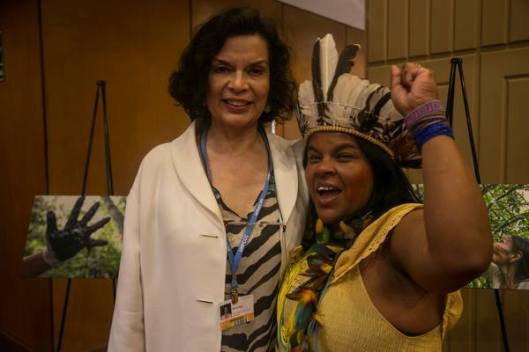
Bianca Jagger of the Bianca Jagger Human Rights Foundation and Sonia Guajajara, National Coordinator of Brazil’s Association of Indigenous Peoples, Maranhão. Brazil. Photo via Amazon Watch.
Following opening remarks, panel sessions moderated by Leila Salazar-Lopez, Program Director at Amazon Watch, and Lake of WECAN International began, featuring women land-defenders sharing their experiences and solutions.
Gloria Ushigua, President of the Association of Sapara Women in Ecuador denounced the destruction caused by the oil industry’s steady encroachment on her people’s territory. Poignantly, Gloria explained the devastation of the Earth and the health, security, and wellbeing of Amazonian communities as a direct result of misconceived notions of development and progress.
Hueiya Alicia Cahuiya Iteca, Vice President of the Huaorani nationality of Ecuador, detailed her fight for an immediate end to all oil exploration and drilling in Yasuni National Park, one of the world’s most important biodiversity hotspots, and home to an incredible array of cultures and communities. Yasuni is one of the few places in the region that thrived during the last ice age, and, quite extraordinarily, is one of the few expected to withstand extreme future climate changes. Despite this, the Ecuadorian government and foreign and national companies are pushing into this previously ‘intangible’ zone, compromising the very survival of the land and its people.
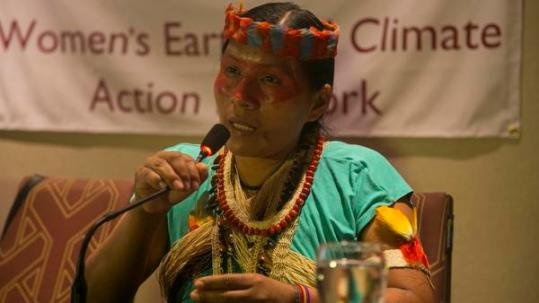
Hueiya Alicia Cahuiya Iteca, Vice-President of the Huaorani nationality of Ecuador. Photo via Atossa Soltani
Hueiya elucidated how the rivers that once flourished and sustained life of breathtaking diversity are now poisoning the fish and causing unheard of cancers and skin diseases, particularly in children.
We must fight to protect the Earth and our territories for these children and future generations, Hueiya explained, reminding all present that if our ancestors had not taken action, we would not be here today.
Tantoo Cardinal, Native Canadian actress and activist addressed the audience next, taking them from the heart of the Amazon rainforest, to the devastated tar sands region in Canada. Tantoo explained the ways in which the poisoning of the Earth and Indigenous communities in North America, unleashed through extractive industries, is but an extension of a colonial mindset,
“For generations, our language was outlawed. Our songs were outlawed. Our way of relationship with creator, with creative force, was outlawed. Our names were taken away.”
Tantoo and hundreds of other men and women from across Canada and the US have been working ceaselessly to insure that exploitation is stopped, and that the root causes of these injustices are addressed.
Nina Gualinga, Kichwa youth leader from Sarayaku, in the Ecuadorian Amazon opened the second panel discussion, reflecting on how she was compelled to become an Earth defender,
“I grew up in a beautiful place in the rainforest of Ecuador, in Sarayaku. I don’t have words to describe my childhood, but it was beautiful. I cannot ask for anything else. When I was about seven years old, maybe eight, this representative of an oil company called CGC came to Sarayaku. It was an Argentinian oil company. And I did not speak Spanish, but I saw that my elders, my mother and all the people in Sarayaku were worried…That was the first time I feared that my land and the life that I knew was going to be destroyed.”
Hailing from Nepal, and representing communities in India and Thailand, Mrinalini (Tina) Rai, Indigenous advisor and gender expert from the Global Forest Coalition, shared her experiences of the challenges women face in forest communities.
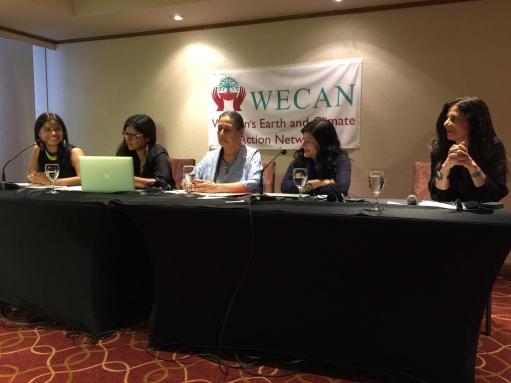
Pictured left to right: Nina Gualinga, Mrinalini (Tina) Rai, Casey Camp Horinek, Atossa Soltani, & Osprey Orielle Lake. Photo via Global Alliance for the Rights of Nature
Ponca Nation elder, actress, long-time activist, and Indigenous Environmental Network representative, Casey Camp-Horinek, reflected on experiences at the frontline of the fight against extractive industries in Oklahoma, USA.
“We’re living in a very destructive area, where I am. We have ConocoPhillips. We have fracking. We have earthquakes as a result of that fracking. We have fish kills. We have cancer rates that are astronomical at this time. We have literal killings. They may not be coming after us with their bayonets and their rifles, but they’re coming at us with nuclear waste, they’re coming at us with fracking, they’re coming at us with pipelines that are carrying that filth from the tar sands, where they’re killing my relatives up there. And they’re bringing it to you.”
Casey’s presentation echoed earlier speakers, highlighting the fact that while not everyone present at the event directly experiences the impacts of extractivism and exploitation at this time, it is imperative that we act in solidarity with the communities who suffer, working to heal past harms and prevent the spreading of this devastation.
Atossa Soltani, Founder and Executive Director of Amazon Watch also spoke, concluding her comments with a fierce testimony and analysis of why fossil fuel reserves must stay in the ground if we are to avert catastrophic levels of climate disruption.
“Looking for more oil and gas is insane. We need to keep the oil in the ground.” Atossa explained.
During the final panel session, presenters shared strategies for implementing a living forest worldview and developing renewable energy alternatives, just economic structures, resistance movements, and systemic change.
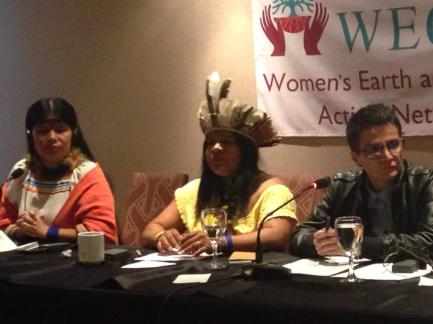
Pictured left to right: Patricia Gualinga, Sonia Guajajara, and Nino Gamisonia. Photo via Atossa Soltani.
Traveling from Maranhão, Brazil, Sonia Guajajara serves as the National Coordinator of Brazil’s Association of Indigenous Peoples, and has been working to expose violations of Indigenous Rights happening across her home country. Specifically, Sonia is campaigning against the industrial agribusiness interests responsible for deforesting and polluting great swaths of land in Brazil, as well as against the construction of several mega-dam projects expected to displace thousands and flood irreplaceable ecosystems.
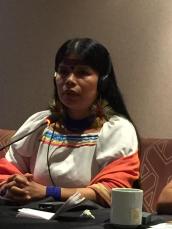
Patricia Gualinga, Kichwa leader from Sarayaku, Ecuador.
Nino Gamisonia of the Rural Communities Development Agency in Abkhazia, Georgia gave fresh insight on a region whose story is seldom told. Nino outlined detailed women-led solar energy projects that are leap-frogging rural communities towards clean energy alternatives in her region.
Speaking from experience leading her communities’ fight to protect diverse cultural and ecologic heritage from oil extraction, Patricia Gualinga, Indigenous Kichwa leader of Sarayaku, Ecuador spoke last:
“The destruction of nature is the destruction of our own energy and of our own existence here on Earth,” Patricia explained, “the destruction of our spaces is the destruction of indigenous populations. And even though you might not believe this, this is your destruction, as well.”
After the panels, several breakout sessions were organized, including ‘Indigenous Women North and South: Defenders of the Mother Earth Treaty’, presented by the Indigenous Environmental Network, and an initial strategy session for distributing and gaining visibility for the ‘Declaration of the Meeting of Women Against Extractivism and Climate Change’, or Declaración del Encuentro de Mujeres Frente al Extractivismo y al Cambio Climático.
This powerful statement, written at a gathering of Indigenous women and allies in Quito, Ecuador in October 2014, denounces false development paradigms, territorial dispossession, and the poisoning of communities and nature. A group of women, including panelist Hueiya Alicia Cahuiya Iteca, worked throughout COP20 to gain recognition and support for their demands. Click here to read the full declaration in Spanish and English.
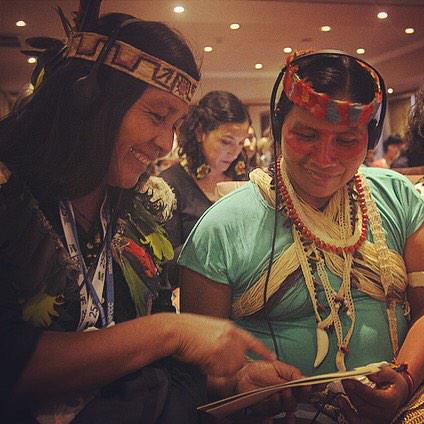
Gloria Ushigua, President of the Association of Sapara Women, Ecuador, and Hueiya Alicia Cahuiya Iteca, Vice-President of Huaorani nationality of Ecuador. Photo via Amazon Watch.
Lake closed the event with a clear directive from all participants that the deliberations, new partnerships, and strategic plans that arose from the gathering would be carried out in 2015. Special thanks to Amazon Watch and the Indigenous Environmental Network for participation in this and other events in Lima.
WECAN International is deeply honored that the team from Democracy Now! attended ‘Women Leading Solutions on the Frontlines of Climate Change-Lima’. Their coverage is presented below, allowing you to hear directly from some of the courageous and inspiring women who spoke at the event.
—–
Blog by Emily Arasim, WECAN International Special Projects & Communication Coordinator
